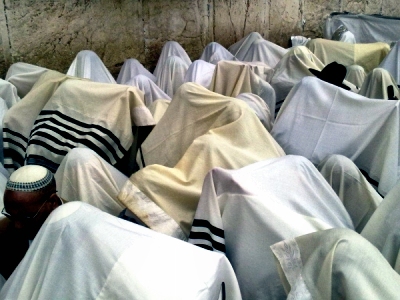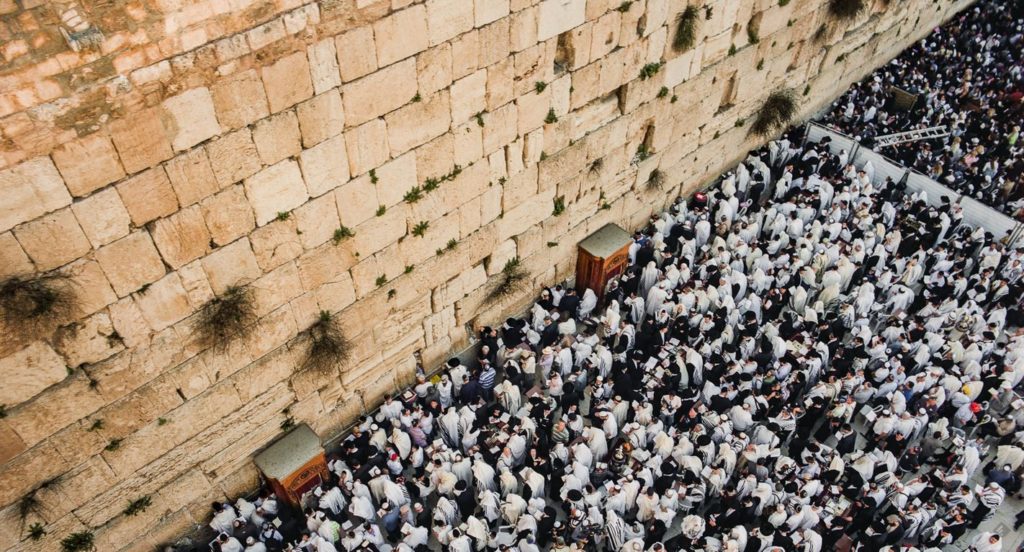“כה תברכו את בני ישראל אמור להם”
The מחבר (סימן קכ”ח סעיף י”ד) rules that נשיאות כפים must be said בקול רם in a loud voice. The Gemara in Sota (38a) learns out this halacha from אמור להם. The Mishna Berurah explains this to mean בקול בינוני. However if there is a large tzibbur then they must do it loud enough that everyone is able to hear them. The Mishna Berurah rules that a Kohen who can’t do it בקול רם is not allowed to do נשיאות כפים and he must leave the בית הכנסת before רצה. The אור לציון rules that if nine people can hear him then he can still דוכן.

There is a famous machlokes between the Bais Halevi and the Chazon Ish if the halacha of שומע כעונה applies to ברכת כהנים. Can one Kohen fulfill his mitzvah by listening to another Kohen? The Bais Halevi says it does not work. Since there is a halacha that it must be said בקול רם this cannot be attained through שומע כעונה. Through the halacha of שומע כעונה it is only considered that the Kohen recited it. But it is not considered as if he said it בקול רם. The Chazon Ish disagrees and holds that anything needed for the mitzvah can also work through שומע כעונה. We find this by the mitzvah of Kiddush where שומע כעונה works even though the one listening does not have a כוס in front of him. It is also true by the reading of the megillah or Sefer Torah where שומע כעונה works even though one does not have a megillah or Sefer Torah in front of himself.
The machlokes is how to understand the foundation of שומע כעונה. Does it mean that I am fulfilling my mitzvah through my friend, or the pshat is that I myself am saying the words through שומע כעונה and am fulfilling the mitzvah myself? It seems that the Mishna Berurah understood the halacha of שומע כעונה like the Bais Halevi, thereby ruling that if he can’t do it בקול רם he cannot דוכן for the halacha of שומע כעונה will not help him.
In Parshas Tazria Metzora in discussing sefiras haomer we pointed out what seems to be a contradiction in the Mishna Berura how שומע כעונה works. The שער הציון (סימן תפ”ט ס”ק ה’) says that if one is in a situation of a ספק where he is not able to count with a brocha he should still try to hear the brocha from someone else. The שער הציון adds ויחשוב בדעתו לצאת בהברכה אם הוא מחויב בדבר – he should think to himself that he only wants to be יוצא with this brocha if he still has an obligation to count. This seems to be a very big חידוש. It seems from the שער הציון that if he does not have this מחשבה it may be a ברכה לבטלה. Why? Isn’t the person saying the brocha obligated in his own brocha? How can it be a good brocha for the one reciting it and a ברכה לבטלה for the one being יוצא through שומע כעונה?
From this שער הציון it seems that through שומע כעונה it is as if the one listening is also saying the words and being יוצא with his own דיבור. Therefore if he is not obligated in the brocha it will be a ברכה לבטלה. He must therefore have in mind that he only wants to be יוצא with the brocha if he is still מחוייב in the mitzvah of sefiras haomer.
However later on in ס”ק ל”ז the Mishna Berurah does not say that you need to have this מחשבה of only being יוצא if you are still מחוייב. The מחבר (סעיף ח’) says that if one forgot to count one of the days, he should count the rest without a brocha. The reason is that there is a machlokes haposkim if every day of sefiras haomer is one mitzvah, or every day is its own mitzvah. Since according to some poskim if he misses one day he is no longer obligated to count, he should continue to count without a brocha. The Mishnah Berura says that if possible he should hear the brocha from someone else and answer amen with כוונה לצאת. The Mishna Berura does not say that you should think to yourself that you only want to be יוצא if you are still obligated in the mitzvah. From here it would seem that שומע כעונה is not that it is considered that I myself am saying the words and being יוצא with my own דיבור. Rather I am being יוצא with his דיבור, and since he is obligated to make the brocha it is not considered a ברכה לבטלה by answering amen if I am not obligated

The Rogatzchaver zt”l as well understands the halacha of שומע כעונה like the Bais Halevi. He explains the minhag why everyone reads the ten sons of Haman themselves. The halacha is that the names must be said in one breath and שומע כעונה doesn’t work that it is considered one breath for the one listening.[1]
Prepared by R’ Avrohom Yehoshua Ziskind
[1] Sources: משנה ברורה,משלחן רבי אליהו ברוך